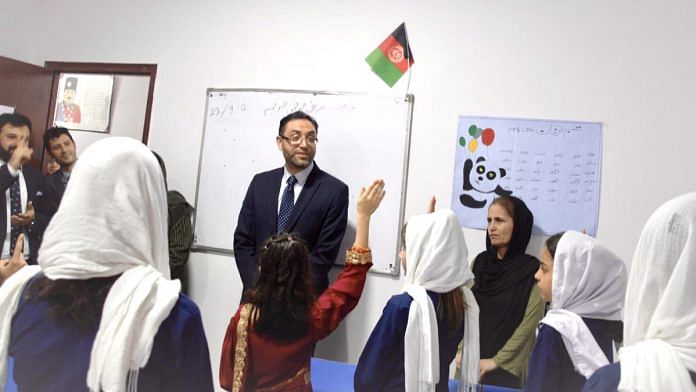New Delhi: Delhi-based Sayed Jamaluddin Afghan School — the only school for Afghan refugees in India — inaugurated a new building space Monday, where it will hold in-person classes for the first time in two years.
The school was funded by the Afghanistan embassy until the Taliban takeover last year cut off its finances. It has been holding online classes for its 250 pupils since the Covid pandemic hit in 2020.
Last October, a shortage of funds forced the school to forfeit a building space it had been renting prior to the pandemic. Since January, however, the school has been receiving financial support from India’s Ministry of External Affairs.
With the new space, the school resumed in-person classes and students were able to return to a normal classroom environment.
For the last 8 months, school authorities had been exploring another avenue: partnerships with other schools in Delhi for access to their classrooms during after-school hours. But since this was to no avail, the school has now rented the ground floor of a commercial building space in Bhogal.
Sayed Jamaluddin Afghan School was first set up at Lajpat Nagar in 1994 and then shifted to Bhogal in the mid-2000s. It enrols pupils from classes 1-12 and employs 32 Afghan teachers.
Also Read: Taliban shirks responsibility, blames Afghan parents for closure of girls schools
New space with six classrooms
The new space is large enough to accommodate six classrooms, and school authorities are actively exploring ways to rent or build a hall, auditorium or playground so that students can have access to open spaces and other extracurricular activities.
In-person classes are being held in two shifts every day — a morning shift from 9am to 12.45pm and an afternoon shift from 1 pm to 4.30pm, according to an official from the Afghan school.
Navita Srikant, a founding member of Gandhi Badshah Khan Educational Society which assisted the school in its search for a building space, told ThePrint: “When it comes to education, what is being taught is always better absorbed if done in a physical classroom. Physical face-to-face interactions between a teacher and a student help with cognitive sharpness, concept clarity, gives students a chance to speak up and creates space for stimulating discussions.”
“I think the students at Sayed Jamaluddin Afghan School, who have been cooped up in online classes for over two years, will greatly benefit from this. I am excited for this new chapter in the school’s history,” the development specialist added.
(Edited by Theres Sudeep)
Also Read: Afghan girls protest against the closure of their school in Paktia



